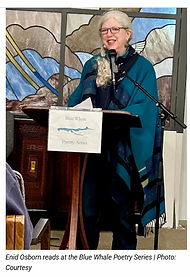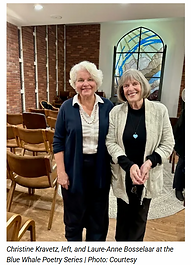About

Enid Osborn - Biography

Enid Osborn has lived in Santa Barbara, California for 45 years and served as Poet Laureate of that city in 2017-2019.
Her book When the Big Wind Comes (Big Yes Press, 2015) takes place during her childhood in Southeast New Mexico, where her family raised quarter horses for a decade.
Her poems appear frequently in CA regional and Southwest journals and anthologies, most recently in the Gunpowder Press release, Women in a Golden State. Her poem “The Place of Loss” was nominated by Askew for a Pushcart Prize.
With Yucca Valley poet Cynthia Anderson, she co-edited the anthology A Bird Black as the Sun: California Poets on Crows & Ravens (Green Poet Press, 2011) featuring the work of 80 poets, living and bygone.
In 1999, having been active in poetry for 10 years, Enid founded Green Poet Project, with primary goals to produce poetry events and support small presses in Santa Barbara and neighboring communities.
She is currently active on the West Coast as a featured poet, guest teacher, poetry judge and coordinator of poetry events on Zoom.
In addition to poetry, Enid writes songs, short stories and reviews. She is a visual artist and longtime advocate for organic growing and preservation of bees. She enjoys travel, film and birding with her musician husband, Jay.
Enid's new collection Pedregosa St. is expected from Sheila-Na-Gig Editions later this year (2025.)
Poet Photo by Jay Scheidemen
Inaugural Laureate reading at
SB Poetry Series, Faulkner Gallery,
SB Public Library 4/09/17
Background Photo: William W. Osborn
Enid Osborn - Press
SB Independent
New Santa Barbara Poet Laureate Enid Osborn Given Title on April 11
Thursday, April 20, 2017
BY DAVID STARKEY
Probably the first thing most people notice about Santa Barbara’s new poet laureate, Enid Osborn, is her smile. It’s shy but friendly and, like everything about Osborn, seems to come from someplace centered and genuine. Her voice, too, is an instrument of welcome. Although she has lived in Santa Barbara for nearly 30 years, Osborn was born and raised in New Mexico, and she still retains more than a trace of a warm Southwestern drawl.Osborn’s sincerity and good cheer were very much on display on April 11, when the Santa Barbara City Council approved and installed her as the city’s seventh poet laureate, a position she will hold until April 2019. A homemade garland crowning her long silver hair, she read her installation poem, “Call Me Poet,” to a standing-room-only crowd of onlookers, some of whom had come from Ventura and San Luis Obispo to wish her well.In a city with so many bards, the competition to be the next laureate is always formidable. However, among poets, the choice of Osborn was not surprising — she is, after all, famous for attending just about every public reading in town — and according to the County Office of Arts & Culture, she “received numerous nominations from a diverse group of educational institutions, poets, and local organizations.”Elizabeth Owen, chair of the Poet Laureate Selection Committee, said Osborn writes “wonderfully vivid, emotional poems that evoke a unique sense of place. Her poems are accessible and inclusive, appealing to a wide audience.” The most complete collection of Osborn’s work can be found in When the Big Wind Comes, published by Big Yes Press, but she has also published numerous shorter “chapbooks,” most recently Pedregosa St., which “talks about life in Westside Santa Barbara … including the death of a dear neighbor, trains, insomnia, a spirited old house, the multicultural neighborhood I inhabit,” Osborn said. She is also drawn to “Family. Trees. The natural world. Death and transcendence. I studied Latin American writers and got a heaping dose of magic realism, which runs through my work. I seem to write about birds and insects a lot,” she added. While Osborn has not yet identified a single big project for her two-year term, she embraces Library Director Jessica Cadiente’s goal of facilitating “new programs that will bring poetry to a wider audience.” Osborn also plans to help create new opportunities for poets to read and challenges other area poets to do the same. She wants to “be an energetic ambassador for poetry and the many gifted poets in our area, including quieter voices we may not have heard.” Finally, she said, “I have a heart for youth and want to turn young people on to poetry through the library, schools, and Poetry Out Loud.”Despite her well-known optimism, the area poetry scene isn’t entirely rosy for Osborn. She noted that while “the achievement of laureateship has created excitement among the poets here, something to reach for … we have become self-impressed. A certain elitism has crept in that we didn’t used to have. Being a grassroots poet, I would naturally steer us toward greater inclusiveness.”Still, she quickly acknowledged that “we are a tight-knit family of poets here in Santa Barbara. We have a strong identity, and we take care of our own.” And when asked what it’s like to be poet laureate during Santa Barbara’s incredibly busy poetry month, Osborn replied, “It’s glorious.” Then she flashed that smile, and you know that for Enid Osborn, “glorious” is probably just the right word.
------------------------------------------------------------
Santa Barbara Independent
December 3, 2024
POETRY CONNECTION / CONNECTING WITH WOMEN POETS LAUREATE
FEATURING POEMS BY SANTA BARBARA POETS LAUREATE EMMA TRELLES AND ENID OSBORN
By Stephanie Barbé Hammer
I am deeply drawn to poetry by women. This rich tradition
juxtaposes the individual with the collective and elevates
accessible language to craft the spoken-song that is poetry.
So, imagine my delight at the chance to hear on November 14,
not one but two Santa Barbara women Poets Laureate at the
Blue Whale Reading Series, curated by the energetic
and welcoming Laure-Anne Bosselaar (also a Santa Barbara
Poet Laureate) and Christine Kravetz.
EMMA TRELLES is a Cuban American poet, who authored Tropicalia (University of Notre Dame Press), winner of the Andrés Montoya Poetry Prize. She is the ninth Poet Laureate of Santa Barbara (2021-23). Trelles shared that she is fascinated by the complex ecology of our city. She finds herself thinking and writing increasingly about place now that she lives here. Correspondingly, her poems can be lyrical meditations on the natural world.
SATURDAY AFTERNOON REVIVAL
By Emma Trelles
The world is falling and the rain is calm.
Gingko leaves disperse, petals blown and gone
To earth. I am reading a book about birds,
What else – their mending and metaphors.
The passage is hushed, lamplight is my home,
The world is falling, the rain calm.
Originally published on the Line 4 bus as part of Poetry Passages, a project in partnership with the SBMTD.
Trelles’ poems can also range widely in viewpoint, just like the visual instruments she references here:
Emma Trelles reads at the Blue Whale Poetry Series | Photo: Courtesy
NIGHT OF TELESCOPES
By Emma Trelles
I have buried my share and hardly anyone knows.
A house must hold ghosts, writing
Names across funereal woods and windows
Good for viewing the lingering past.
This night of telescopes fixes the cold
October sky—a Saturn so delicate as if
Sketched by moths holding to nearby stones
For their lives. The sutures of the moon drift
Into sharpness and a man points to the inevitable screen
Another haunt in this dim garden where voices rise
Across pines and the invisible fountain locked
In the same little song. Here is the Sea of Crisis
And I would recognize its expanse anywhere
Having visited often, even beneath my lids when I disappear
At night to visit with a father who no longer knows me
Or the dead who always do, and glow like the rain or a rose
Finished with the business of becoming. I can’t say the worst
Because I’ll keep living it. Machine of the mind. Belt
Of the hunter. I can spot his patient blade from either coast—
The one where I drown the one where I love the one
Where I keep rowing through the blaze and the black.
Originally published in Zócalo Public Square.
Trelles’ poem invites us to simultaneously consider and wonder at the close and the remote — our family wounds, and the beauty of the cosmos.
ENID OSBORN is a long-time resident of Santa Barbara and served as Poet Laureate of Santa Barbara from 2017 to 2019. She is the author of the book When the Big Wind Comes, and a series of chapbooks including Queen in Exile, Milagro, Wormlore, and The Burden of Decency.
Osborn read work that navigated between the natural and the personal, invoking but not dwelling on sadness, loss, change, and hope, as in the following elegiac poem, which calls to mind Walt Whitman.
TREE PRAYER
By Enid Osborn
I summon my soul,
tree upon whose limbs I hang.
I summon my soul, upon whose trunk I lean.
I summon my radiant soul,
tree upon whose roots I lay despair,
this corpse of bitter losses
I offer as dark bread
to the soil between her roots.
I shall rise and walk in lightness.
I summon my soul.
My name means soul.
I summon my radiant soul.
May the trunk of this tree
give me strength.
May I unloose my hands from sorrow
and look up to see how every gift
hangs shining from her boughs.
I touch this tree always,
at whose living feet I touch the earth.
Elsewhere, Osborn’s poems celebrate resilience and power in expected places:
GUILLERMO
By Enid Osborn
After a photo by Henri Cartier Bresson (1934)
of a Mexican woman in mourning clothes
with two small children.
My name is Guillermo.
I was ten months old when this photo was taken.
My father Guillermo had died one year before.
My mother’s heart beat onm but her moods abruptly ceased,
the seasons having no dominion, and occasions—
there were no occasions, save the tides of her grief,
oppressive in their regularity as a heavy man’s snore.
The celebration of my birth
lasted the duration of one blessing candle,
then she wrapped me in a shroud, pobre hijo sin padre,
and tied me to her body.
Her weeping shook my waters as before,
and I waited, perplexed, for life to begin.
My sister Claudia lived in the world of color
but, having lost both parents at once,
attached herself to the wraith of my mother
like a weird little mendicant.
When she cried, my mother
did not pick her up
but wept in the adjoining room.
And so it was that darkness delayed my birth.
I grew in my shroud like a secret child,
until my elbow sharpened and split the cloth.
I came out needing shoes like El Niño,
telling my visions to anyone who would listen.
My mother, astonished,
uttered a sound almost like laughter.
In an email conversation, Osborn opined that “personal poems have the greatest authenticity and, therefore, the greatest power to touch lives.”
Both these poets do just that: touch lives through the personal. Their poetry moves us out of our particular individual bubbles towards greater and deeper communal consciousness.
About the Guest Columnist: Stephanie Barbé Hammer is a seven-time Pushcart Prize nominee in fiction, nonfiction, and poetry. Her most recent book, the mystery Journey to Merveilleux City was a 2023 finalist for the Foreword INDIE book award.





--Émile Zola